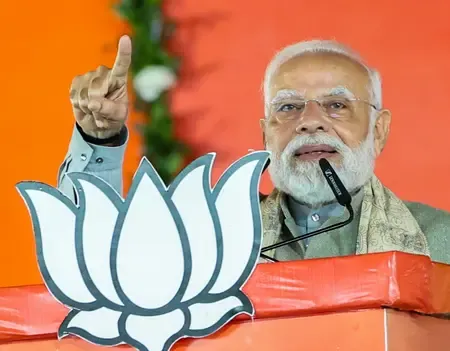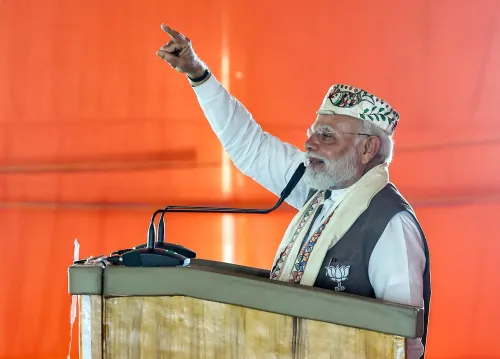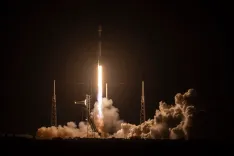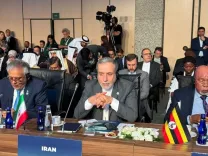Is the World Astonished by India's Progress? PM Modi Speaks in Bikaner

Synopsis
Key Takeaways
- PM Modi inaugurated projects worth over Rs 26,000 crore.
- Redeveloped 102 railway stations across 18 states.
- Focus on clean energy with multiple solar initiatives.
- New nursing colleges to bolster healthcare education.
- Investment in regional connectivity and infrastructure.
Bikaner, May 22 (NationPress) Prime Minister Narendra Modi has officially inaugurated and laid the groundwork for a series of significant development initiatives totaling over Rs 26,000 crore in Rajasthan's Bikaner on Thursday.
During the event, he also launched 102 redeveloped railway stations across 86 districts in 18 states and Union Territories, as part of the Amrit Bharat Station Scheme, with an investment of approximately Rs 1,100 crore.
This initiative includes a combination of major and minor stations located in Andhra Pradesh, Assam, Bihar, Chhattisgarh, Gujarat, Haryana, Himachal Pradesh, Jharkhand, Karnataka, Kerala, Madhya Pradesh, Maharashtra, Puducherry, Rajasthan, Tamil Nadu, Telangana, Uttar Pradesh, and West Bengal.
While addressing a public rally, PM Modi remarked, "Today, I stand before you after seeking the blessings of Karni Mata. With her blessings, our vision for a Viksit Bharat is becoming stronger. Just moments ago, I inaugurated and laid the foundation for development projects exceeding Rs 26,000 crore. Congratulations to the people of Rajasthan for this achievement."
"In pursuit of a Viksit Bharat, a significant campaign is underway to enhance the nation's infrastructure. Over the past 11 years, we've made remarkable progress in modernizing roads, highways, trains, and railway stations. The financial commitment for these infrastructural advancements is now six times greater than before," he added.
"The world is astonished by the developmental strides India is making," PM Modi stated, citing examples like the Chenab Bridge, Sela Tunnel in Arunachal Pradesh, Atal Setu in Mumbai, and the Pamban Bridge in South India.
The Prime Minister highlighted that India is modernizing its railway network with the introduction of trains such as Vande Bharat, Amrit Bharat, and Namo Bharat, showcasing the new pace and technological advancements in the country.
Earlier on the same day, the Prime Minister paid his respects at the revered Karni Mata Temple and visited the newly upgraded Deshnoke railway station, one of the 103 stations revamped under the Amrit Bharat Station Scheme.
PM Modi also flagged off the new Bikaner-Mumbai Express train.
The Amrit Bharat Station Scheme aims to enhance railway stations nationwide, improving passenger facilities, ensuring accessibility for Divyangjan (individuals with disabilities), and incorporating culturally rich designs.
A total of 103 stations, modernized for Rs 1,100 crore, were inaugurated by the Prime Minister, including eight stations in Rajasthan: Fatehpur Shekhawati, Deshnok, Bundi, Mandalgarh, Gogamedi, Rajgarh, Govindgarh, and Mandawar-Mahua Road.
Particularly, the Deshnoke station has been designed to showcase local architectural traditions, featuring temple-style arches and decorative pillars.
As part of this vision, the Prime Minister laid the foundation for the 58 km Churu-Sadulpur rail line and dedicated the electrification of crucial railway segments, including Suratgarh-Phalodi (336 km), Phulera-Degana (109 km), Udaipur–Himmatnagar (210 km), Phalodi–Jaisalmer (157 km), and Samdari–Barmer (129 km).
In terms of road infrastructure, the Prime Minister launched initiatives aimed at enhancing both civilian connectivity and bolstering national security.
This includes laying the groundwork for three vehicular underpasses on NH-58 in Pushkar, as well as widening NH-11 and NH-70.
Additionally, he dedicated seven significant national highway projects worth Rs 4,850 crore, expected to enhance military mobility and stimulate the regional economy.
The Prime Minister's visit also underscored India's commitment to clean energy. He laid the foundation stone for various solar energy initiatives, including a 300 MW ground-mounted solar project by NEEPCO in Bikaner and a 100 MW project by SJVN in Nawa.
Solar projects in Didwana and Kuchaman were also launched. Transmission systems under Powergrid's Sirohi and Mewar divisions were initiated to improve grid connectivity.
Furthermore, he inaugurated three vital power infrastructure projects: Power Grid Neemuch Transmission System, a power evacuation project in Bikaner, and the capacity expansion of the Fatehgarh-II Power Station.
Among other initiatives, the 500 MW Kalasar and 300 MW Shimbhu Ka Bhurj solar power plants will be crucial in strengthening India's renewable energy framework, supported by indigenous solar PV modules under the Make in India mission.
The Prime Minister also launched the upgradation and maintenance of 12 state highways covering 757 km under the Rajasthan State Highway Development Programme, with a total investment of Rs 3,240 crore.
Notable routes include Mangaliyawas-Padukalan (State Highway-102), Beawar-Tehla-Alniyawas (SH-59 and SH-104), and Dantiwada-Pipar-Merta City (SH-21).
Plans are in place for future upgrades of another 900 km of roadways, including the Gotan-Sathin Highway, which will link industrial and border areas more effectively.
To enhance the state's healthcare infrastructure, the Prime Minister inaugurated four new nursing colleges in Rajsamand, Pratapgarh, Bhilwara, and Dholpur.
These institutions will help fortify the healthcare workforce and improve access to quality medical education across Rajasthan.
Additionally, two electrical substations -- 132 kV GSS Rajpura in Bikaner and 132 kV GSS Sarda in Udaipur -- will be inaugurated to improve power distribution in the region.
These upgrades are a crucial part of ensuring a stable and reliable energy supply across the state.









